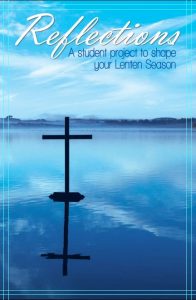 This post is part of a series of Lenten reflections using worship songs to engage the journey of Lent. Each reflection involves meditation on one song and a portion of scripture from the Gospel of Luke. These reflections are a part of the senior project of Southwestern College student Mallorie Coffman. Graphic design by Maggie Collett.
This post is part of a series of Lenten reflections using worship songs to engage the journey of Lent. Each reflection involves meditation on one song and a portion of scripture from the Gospel of Luke. These reflections are a part of the senior project of Southwestern College student Mallorie Coffman. Graphic design by Maggie Collett.
You may use the Chapters for Reflection from the Gospel of Luke to shape your approach to these lyrical meditations. The author has also provided shorter focus verses.
Chapters for Reflection: Luke 13-16
Wonderful Cross
Chris Tomlin (original hymn lyrics by Isaac Watts)
When I survey the wondrous cross
On which the Prince of glory died
My richest gain I count but loss
And pour contempt on all my pride
See from His head, His hands, His feet
Sorrow and love flow mingled down
Did e’er such love and sorrow meet,
Or thorns compose so rich a crown?
O the wonderful cross
O the wonderful cross
Bids me come and die
And find that I may truly live
O the wonderful cross
O the wonderful cross
All who gather here
By grace draw near and bless Your name
Were the whole realm of nature mine
That were an offering far too small
Love so amazing, so divine
Demands my soul, my life, my all
According to Chris Tomlin, Easter is the meeting between “sorrow and love.” The one which is more visible depends on looking towards Easter through the time of Lent or reflecting back on Easter in the weeks following. The Crucifixion and Resurrection are equally beautiful and wonderful. Throughout this time of Lent and Easter, how do both sorrow and love echo in your life?
Chris Tomlin offers another seemingly contradictory statement in the chorus. Jesus “bids me come and die and find that I may truly live.” Jesus speaks often about life and death throughout the scripture, but rarely is he describing a person’s physical and bodily death on this Earth. What does it mean to you to be beckoned to a death so that your life can then be truly lived?
The things we do while we are here on this Earth can be great, and even amazing with God’s presence. “My richest gain I count but loss” not because the achievement was unsuccessful or not an honorable accomplishment, but when compared with the amazing things Christ did on the Wonderful Cross, our actions are trivialized. That does not mean we should waste our time doing nothing; Tomlin even says God “demands my soul, my life, my all.” It is important to recognize God’s grace, given to us through God’s sacrifice and Jesus’ crucifixion, is our connection to God and his love. We are not rewarded by our acts, but by God’s grace alone. What ways have you felt God’s grace moving in your life?
Focus Scripture: Luke 15:1-3, 11b-32
Many times we have heard the story of the prodigal son as a great example of forgiveness and love. Yet the father also distributed great grace to the son. The son received something far beyond what he deserved. God gives all those wonderful things to us especially grace when we feel we don’t deserve it, as the son initially did in Luke 15:21. God loves us beyond our comprehension and because of His love we have received God’s grace. Time after time God shows this to both the Hebrew people and contemporary Christians. How does this perception of grace alone affect your relationship with God and others?
Although the story of the prodigal son ends in Luke 15, it is engaging to contemplate the family’s life after the younger son’s return. Was the younger son changed by the father’s gift of grace? Did the older son rid himself of resentment and realize there was enough grace for him? How does your recreation of their relationship with each other reflect in your life? Where can you find sorrow and love in their story and yours?
–Mallorie Coffman






